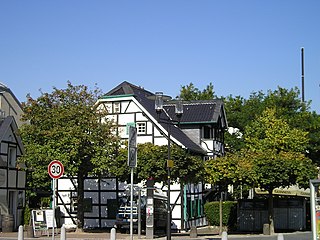
Troisdorf is a city in the Rhein-Sieg-Kreis (district), in North Rhine-Westphalia, Germany.

Kamen is a town in North Rhine-Westphalia, Germany, in the district Unna.

Erkrath is a town in the district of Mettmann, in North Rhine-Westphalia, Germany.

Langenfeld is a town in North Rhine-Westphalia (Germany) in the district of Mettmann. The suburban city is located between Düsseldorf and Cologne. Langenfeld was formed from the two localities of Richrath and Reusrath and received city rights in 1948.

Recklinghausen is the northernmost city in the Ruhr-Area and the capital of the Recklinghausen district. It borders the rural Münsterland and is characterized by large fields and farms in the north and industry in the south. Recklinghausen is the 60th-largest city in Germany and the 22nd-largest city in North Rhine-Westphalia.

Gevelsberg is a town in the district of Ennepe-Ruhr-Kreis, in North Rhine-Westphalia, Germany.

Sprockhövel is a town in the district of Ennepe-Ruhr-Kreis, North Rhine-Westphalia, Germany.

Salzkotten is a town in the district of Paderborn, in North Rhine-Westphalia, Germany. The name Salzkotten is based in the former salt production, which gave Salzkotten its raison d'être. Salt was found in the salty springs around the town.

Moers is a German city on the western bank of the Rhine, close to Duisburg. Moers belongs to the district of Wesel.

Bad Honnef is a spa town in Germany near Bonn in the Rhein-Sieg district, North Rhine-Westphalia. It is located on the border of the neighbouring state Rhineland-Palatinate. To the north it lies on the slopes of the Drachenfels mountain, part of the Siebengebirge.

Frechen is a town in the Rhein-Erft District, North Rhine-Westphalia, Germany. Frechen was first mentioned in 877. It is situated at the western Cologne city border.

Warstein ( ) is a municipality with town status in the district of Soest, in North Rhine-Westphalia, Germany. It is located at the north end of Sauerland.

Castrop-Rauxel, often simply referred to as Castrop by locals, is a former coal mining city in the eastern part of the Ruhr Area within the state of North Rhine-Westphalia in Germany.

Spenge is a town in the district of Herford, in North Rhine-Westphalia, Germany

Rösrath is a town in the Rheinisch-Bergischer Kreis (district) in North Rhine-Westphalia, Germany. The earliest known documents mentioning the settlement Rösrath can be found in documents dated to 1356. There have been findings of Paleolithic and Mesolithic tools in the town area Forsbach. The community was elevated to the town status in 2001.

Isselburg is a town in the district of Borken, in North Rhine-Westphalia, Germany. It is located on the river Issel, near the border of the Netherlands, and approximately 10 km west of Bocholt.

Kerken with the towns of Aldekerk, Eyll, Nieukerk and Stenden, is a municipality in the district of Kleve in the state of North Rhine-Westphalia, Germany. It is located near the border with the Netherlands, approx. 15 km north-east of Venlo.

is a town in the district of Steinfurt, in North Rhine-Westphalia, Germany. It is situated near the junction of the Mittellandkanal and the Dortmund-Ems Canal, approx. 10 km east of Rheine.

Hamminkeln is a town in the district of Wesel, in North Rhine-Westphalia, Germany. It is situated on the river Issel, approximately 10 kilometers north of Wesel and 15 km south of Bocholt. It is twinned with Sedgefield, United Kingdom and the largest town in the district of Wesel.

Neukirchen-Vluyn is a town in the district of Wesel, in North Rhine-Westphalia, Germany. It is situated approximately 5 km west of Moers, and 15 km north of Krefeld.

























